The EU’s dangerous non-foods watchdog Safety Gate has found that cars, cosmetics and toys were the most reported products to pose potential health risks due to their concentration of chemical substances.
On 13th March, the European Commission published its annual report on the Safety Gate, the European Rapid Alert System for dangerous non-food products. The report covers alerts notified during 2022, and the responses given by national authorities.
The most common products clocked by Safety Gate were toys, followed by motor vehicles, cosmetics, clothing, and electrical appliances. Last year, cosmetic products had a significantly higher number of alerts due to the use of recently banned chemical substances in perfumes and creams. Though this accounts for some of the alerts, risks were also found in a wider range of items. Certain toys had an “excessive concentration” of phthalates, which can cause reproductive system problems.
Whilst risks from chemical substances reigned supreme in 2022, there were also a high number of instances of products that could cause injury or choking.
The 30 nations of Safety Gate, including EU member states, were faced with 2,117 alerts and followed up with actions 3,932 times. Market surveillance authorities checked on these alerts, and 84% of the actions included additional measures being put in place, including recalls on potentially dangerous products.
WHAT NEXT?
A 2021 proposal to update regulations on product safety will soon replace the older version, modernising the basic structure for non-food consumer products. The new document will cover the challenges posed by the advent and rise of online sales and new technologies to provide a stronger safety net for the public.
Additionally, companies such as AliExpress, Amazon, eBay, Rakuten France, Allegro, Etsy, bol.com, eMAG, Wish.com, Cdiscount and Joom are already part of an agreement called the Product Safety Pledge to remove unsafe items from their platforms.
This, they hope, will ensure only safe products are sold in the EU and will improve product safety regulations, make recalls faster and easier and streamline surveillance efforts.
Sign up for the Monaco Life newsletter. For the latest news, follow us on Facebook, Twitter, and Instagram.
Photo: Illustration picture of the laboratory for health and safety where the toys are tested when suspected not to be to the European standards. Source: European Commission
